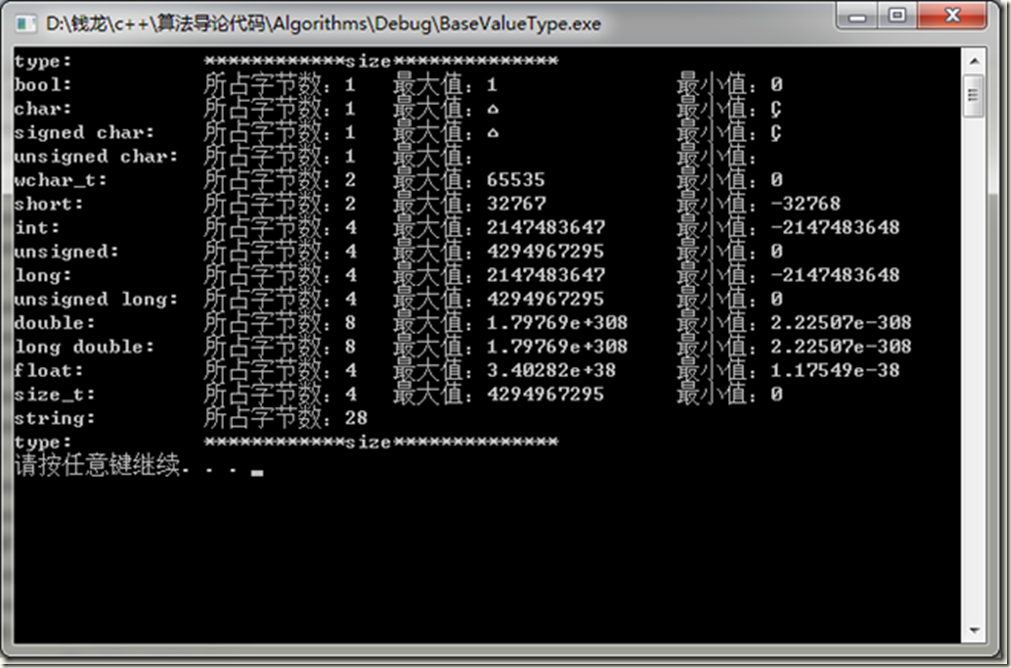c++中各种数据类型所占字节
2016-04-24 10:32
423 查看
求各种数据类型所占用的字节数可调用sizeof函数,求各种数据类型的最大值可以调用limits标准库中的numeric_limits<T>::max(),numeric_limits<T>::min()函数
#include<iostream>
#include<string>
#include <limits>
using namespace std;
int main()
{
cout << "type: \t\t" << "************size**************" << endl;
cout << "bool: \t\t" << "所占字节数:" << sizeof(bool);
cout << "\t最大值:" << (numeric_limits<bool>::max)();
cout << "\t\t最小值:" << (numeric_limits<bool>::min)() << endl;
cout << "char: \t\t" << "所占字节数:" << sizeof(char);
cout << "\t最大值:" << (numeric_limits<char>::max)();
cout << "\t\t最小值:" << (numeric_limits<char>::min)() << endl;
cout << "signed char: \t" << "所占字节数:" << sizeof(signed char);
cout << "\t最大值:" << (numeric_limits<signed char>::max)();
cout << "\t\t最小值:" << (numeric_limits<signed char>::min)() << endl;
cout << "unsigned char: \t" << "所占字节数:" << sizeof(unsigned char);
cout << "\t最大值:" << (numeric_limits<unsigned char>::max)();
cout << "\t\t最小值:" << (numeric_limits<unsigned char>::min)() << endl;
cout << "wchar_t: \t" << "所占字节数:" << sizeof(wchar_t);
cout << "\t最大值:" << (numeric_limits<wchar_t>::max)();
cout << "\t\t最小值:" << (numeric_limits<wchar_t>::min)() << endl;
cout << "short: \t\t" << "所占字节数:" << sizeof(short);
cout << "\t最大值:" << (numeric_limits<short>::max)();
cout << "\t\t最小值:" << (numeric_limits<short>::min)() << endl;
cout << "int: \t\t" << "所占字节数:" << sizeof(int);
cout << "\t最大值:" << (numeric_limits<int>::max)();
cout << "\t最小值:" << (numeric_limits<int>::min)() << endl;
cout << "unsigned: \t" << "所占字节数:" << sizeof(unsigned);
cout << "\t最大值:" << (numeric_limits<unsigned>::max)();
cout << "\t最小值:" << (numeric_limits<unsigned>::min)() << endl;
cout << "long: \t\t" << "所占字节数:" << sizeof(long);
cout << "\t最大值:" << (numeric_limits<long>::max)();
cout << "\t最小值:" << (numeric_limits<long>::min)() << endl;
cout << "unsigned long: \t" << "所占字节数:" << sizeof(unsigned long);
cout << "\t最大值:" << (numeric_limits<unsigned long>::max)();
cout << "\t最小值:" << (numeric_limits<unsigned long>::min)() << endl;
cout << "double: \t" << "所占字节数:" << sizeof(double);
cout << "\t最大值:" << (numeric_limits<double>::max)();
cout << "\t最小值:" << (numeric_limits<double>::min)() << endl;
cout << "long double: \t" << "所占字节数:" << sizeof(long double);
cout << "\t最大值:" << (numeric_limits<long double>::max)();
cout << "\t最小值:" << (numeric_limits<long double>::min)() << endl;
cout << "float: \t\t" << "所占字节数:" << sizeof(float);
cout << "\t最大值:" << (numeric_limits<float>::max)();
cout << "\t最小值:" << (numeric_limits<float>::min)() << endl;
cout << "size_t: \t" << "所占字节数:" << sizeof(size_t);
cout << "\t最大值:" << (numeric_limits<size_t>::max)();
cout << "\t最小值:" << (numeric_limits<size_t>::min)() << endl;
cout << "string: \t" << "所占字节数:" << sizeof(string) << endl;
// << "\t最大值:" << (numeric_limits<string>::max)() << "\t最小值:" << (numeric_limits<string>::min)() << endl;
cout << "type: \t\t" << "************size**************" << endl;
system("pause");
return 0;
}相关文章推荐
- C 库 —— time.h
- C 库 —— math.h
- 手把手教你用C++ 写ACM自动刷题神器(冲入HDU首页)
- 第四次C++作业
- C++中二维数组总结
- 【C++】文件读写
- list容器的C++代码实现
- C++作业4
- C++实验4-乘法口诀表
- B树的C++代码实现
- C++第四次实验-项目3:乘法口诀表
- C++之模板与泛型编程(下):类模板
- 红黑树的C++代码实现
- 中国剩余定理的解析及记忆(扩展欧几里得算法的运用)
- 素数表的快速建立,合数分解,1-2^31内某个长度小于10w的区间素数筛选的三个模板及解析
- 线段树3种基础模型的理解和记忆(任意区间求和,任意区间的所有数加上相同数(懒操作),任意区间所有数变成同一个值再求和)
- POJ c++ 程序设计 第五周 Part1
- POJ c++ 程序设计编程题第4周 三
- 字符编辑技术C语言实现
- 字符编辑技术C语言实现

